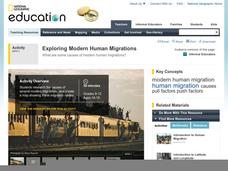Channel Islands Film
Sa Hi Pa Ca (Once Upon a Time): Lesson Plan 2
What tools do archaeologists and anthropologist use to learned about what life was like in the past. After watching West of The West's documentary Once Upon a Time that details how scientists use artifacts to establish a history of the...
Anti-Defamation League
Representing the People: Diversity and Elections
After studying statistics and reading articles about diversity in the 2018 through 2020 U.S. elections, young social scientists discuss what they believe is the impact of having more diverse elected officials. Individuals then select one...
Curated OER
Earth, the Universe, and Culture
Students view segment of documentary, Swift: Eyes Through Time, explore famous scientists, their theories, places of origin, and culture, document scientific viewpoints of famous scientists throughout history, and discuss geographical...
Curated OER
What's Along the Coast?
Students research an area with at least one dominant geographical feature. Then they display their findings in a realistic 3-dimensional presentation. Students also prepare ancillary material to support their project. Finally, they chart...
Alabama Department of Archives and History
America in Space: German Voices from Huntsville, Alabama
Project Paperclip, the Redstone Arsenal, and the Huntsville Space Center are all featured in a resource that investigates the contributions of Dr. Werner von Brawn and other German scientists to the US space program. Working individually...
Channel Islands Film
Human Impact on the Food Web of Santa Cruz Island
What happens when a non-native species is introduced onto an island? Santa Cruz Island, part of the Channel Island chain located off the coast of southern California, provides the perfect laboratory for young environmental scientists to...
Channel Islands Film
Island Rotation: Lesson Plan 1
How do scientists provide evidence to support the theories they put forth? What clues do they put together to create these theories? After watching West of the West's documentary Island Rotation class members engage in a series of...
Alabama Wildlife Federation
Colors to Dye for!
Nature provides a rainbow of colors at one's fingertips. A hands-on activity uses natural plant materials to create all-natural dyes. Plants range from fruits and vegetables to flowers and greens. After extracting the pigments, eager...
Encyclopedia Britannica
Beyond a Two-Party System
Young political scientists go beyond the two-party system and research third-party candidates running in the 2020 US Presidential election. Groups present background information about the candidate, the party's platform points, and a...
Encyclopedia Britannica
Meta-Study: Political Brains
Are there differences in the brains of liberals and conservatives? That is the question young political scientists are challenged to answer. Class members examine studies, consider how the results are presented, and how the studies were...
Encyclopedia Britannica
Candidate Reflection Essay
After writing about which of the 2020 presidential candidates the class has researched most closely represents their ideas, young political scientists take a 2020 Presidential Election Candidate Quiz to determine what candidate they in...
Facing History and Ourselves
Defining Democracy
For democracies, it is both the best and the worst of times. As part of a study of the challenges facing democracies, young political scientists seek first to define democracy, and then to consider the relationship between democracy and...
Curated OER
Science as a Source of Social Controversy
High schoolers research the two opposing views and biographical information about Ptolemy and Copernicus in order to be familiar with the societal viewpoints that influenced the thinking of these two scientists. Students role-play...
Curated OER
African American Scientists
Students study several important African American scientists and explore their lives. They recreate scientists' experiences through journal entries.
Curated OER
Scientists Use Web Site to Report Volcano Activity
Young scholars react to statements about volcanoes, then read a news article about scientists monitoring eruptions at Augustine volcano in Alaska. In this earth science and current events lesson, the teacher introduces the lesson with a...
Curated OER
Scientists Study Dinosaur "Mummy"
Students share ideas about how scientists know about dinosaurs, then read a news article about the recently found remains of a hadrosaur. In this dinosaur lesson plan, the teacher introduces the article with a class discussion and...
Scholastic
Drug Abuse in Social Settings: A Serious Task for Teens
Students discuss why drug abuse risk is higher in social settings. In this health science lesson, students interpret real life statistics on teen drug use. They describe refusal and prevention strategies.
National Geographic
Exploring Modern Human Migrations
Using maps, images, websites, and handouts, learners work to understand the nature of human migrations. They compare and contrast human migration from the past to the present, identify causes for migration, and trace migration routes on...
NOAA
I Can't Breathe!
The Gulf of Mexico dead zone, an area of low oxygen that kills marine life, costs the United States $82 million every year. Young scientists research anoxic ocean environments then come up with a hypothesis for the cause of the Gulf of...
Institute of Electrical and Electronics Engineers
Working with Watermills
In collaborative groups, emerging engineers or environmental scientists plan and construct a water wheel or watermill that rotates for a total of three minutes. Everything you need to carry out this lesson is included: objectives,...
Curated OER
"The Scientist and The Prince: Two Interesting Early Pennsylvania Immigrants
Young scholars examine immigrants including why people immigrated to America and their places of origin. In this immigrants instructional activity students analyze the importance of immigrants and the obstacles that they encounter.
NOAA
Technology I
Isn't technology great? The 12th installment of a 23-part NOAA Enrichment in Marine sciences and Oceanography (NEMO) program introduces technology that marine scientists use. Pupils take part in an activity using conductivity,...
American Institute of Physics
African Americans in Astronomy and Astrophysics
A two-part lesson focuses on the contributions to the fields of astronomy and astrophysics of two African Americans: Benjamin Banneker and Dr. George Carruthers. In part one, scholars learn about Benjamin Banneker by examining his...
Equality and Human Rights Commission
Empathy
Scientists discovered empathy is a learned behavior, not an instinct or inherited behavior. The second lesson in a 12-part series focuses on teaching empathy, an important life skill. Scholars use discussion and role playing to practice...

























